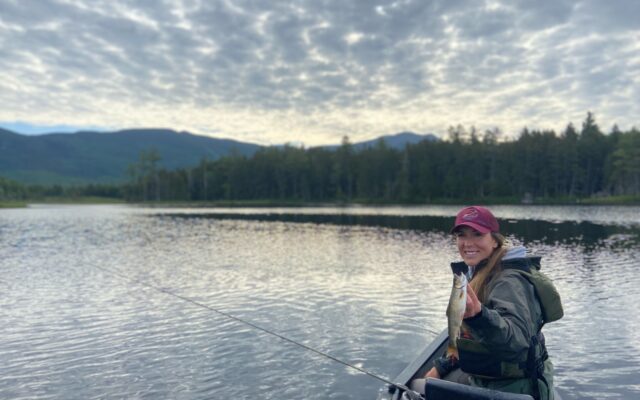
Savoring sunrise casts on a pond in Baxter State Park
By Christi Holmes
I tied a Grey Ghost streamer to the leader of my fly rod and counted out the turns of the line in my head until I got to six, then secured the knot. Fog hung over the mirrored lake. Mixed conifers lined the shore and their tannins stained the pond the color of tea.
I felt the energy of the water, just inches beneath me, as Travis paddled our canoe along the shore of Kidney Pond. It was the same canoe seen on every lakefront lawn in Maine — a dark green Old Town, faded from years left in the sun.
Mornings in June were chilly enough to need a jacket, and that morning was no exception. It was 4:30 a.m. and the long days required an early alarm to catch the morning bite. We would take an afternoon nap, we had decided, planning to take advantage of one of the few luxuries that a weekend camping afforded us.
“That kind of looks like the shape of a moose,” I said to Travis, nodding toward a shadow across the cove. “But I haven’t seen it move.”
The water dripped off each paddle stroke as Travis brought us closer to the shadow. The shadow moved and a cow moose emerged at the edge of the pond. She stared at us. I wondered if she had ever seen a canoe before.
When she turned to leave, I cupped my hands around my mouth and did my best moose call, a moany, nasally “waaaa,” and she turned around and returned to the shore, evidently questioning her previous conclusion. After a few more seconds of staring, she slipped back into the forest.
A subtle splash brought me back to the morning’s goal. A fish had risen near the shore to our right. I watched the circular ripple, growing larger but less defined, willing the fish to reveal itself once more. I knew Travis saw it; he stopped the forward motion of the canoe with a back paddle and I yanked line off my reel preparing to cast.
I love fly fishing for native brook trout. It is so pure and natural, like hearing a baby’s giggle, or eating homemade bread with real butter. I cast my six weight line toward where the fish had risen. The line sank for a few seconds and I began stripping it in with short, quick pulls.
Nothing.
The sun’s rays lit up Katahdin, looming on the horizon. No one else at the campground was awake yet; the pond was ours. Even the mosquitoes and black flies slept. It was quiet, yet loud with birds — sounds you only notice when camping.
A beaver appeared off the bow, its deep brown eyes and bushy face taking us in. Then it slipped silently under the water, no slap of the tail.
A breeze kicked up as the sun was overtaken by dark clouds. A lonely loon dove frequently off in the distance. Was he eating trout? His cry echoed, and it sounded particularly melancholy as rain started to fall.
After a few more casts without a nibble, I pulled my hood over my head and I reeled my line in. I tied on a yellow, bead-headed Wooly Bugger. I cast back and forth, letting more line out with each cast, before landing my fly and letting it sink. Fishermen are the ultra-optimists.
“One more cast.” “My lucky fly will do the trick.” “This spot over here is the one.” “Five more minutes.”
The loon joined us, and eventually, the fish did, too.